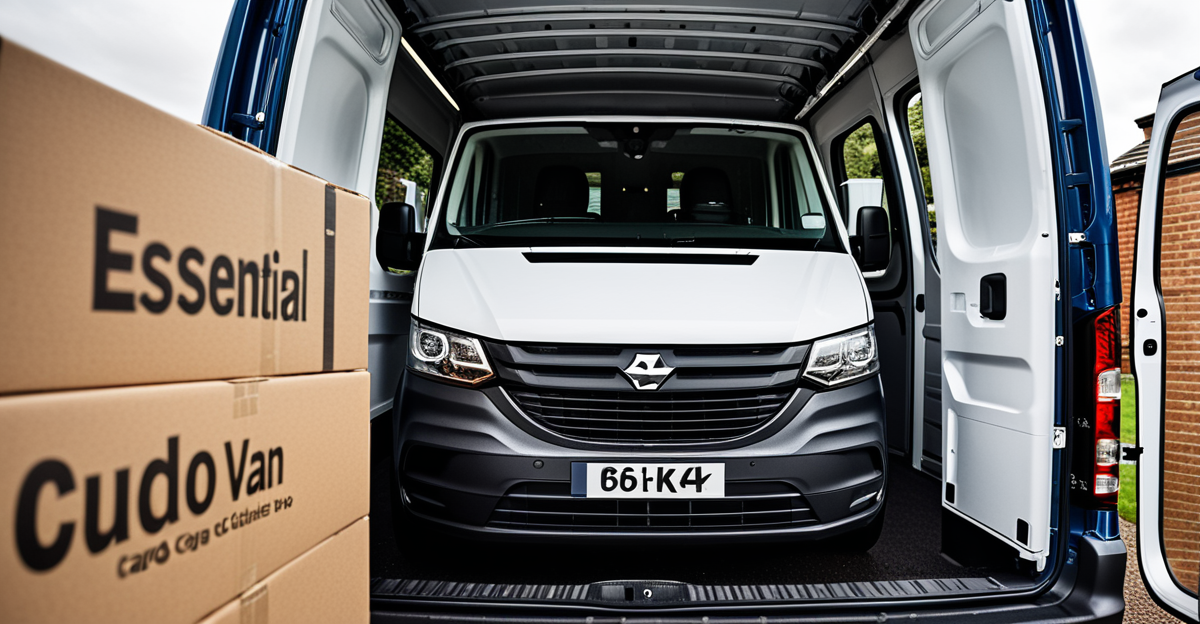Understanding Business Needs for Cargo Vans
In order to make an informed decision when purchasing a cargo van, it’s crucial to conduct a thorough UK market analysis. This involves identifying the specific transportation needs based on industry demands. Different sectors require varying configurations for load capacity and cargo dimensions, which must align with the business requirements. Understanding these needs ensures that your investment in a cargo van directly supports operational goals.
Evaluating load capacity is essential to determine if the vehicle can handle the weight and volume of goods you intend to transport. Additionally, considering cargo dimensions will help decide whether items need stacking or can be laid flat. Vehicle adaptability is another critical factor for anticipated future growth. A van that can be easily reconfigured or expanded with new fittings supports scaling operations without the need for additional purchases.
In parallel : Expert Tips and Tricks to Prepare Your Car for the UK MOT Emissions Test: The Definitive Guide
In conclusion, identifying key business requirements and conducting a comprehensive UK market analysis are crucial steps. These processes ensure that the chosen cargo van aligns with specific industry demands and future enterprise objectives.
Types of Cargo Vans Suitable for UK Businesses
Before embarking on the purchase of a cargo van, it is vital to understand the varying cargo van types and their applications within the UK business landscape. Selecting the right vehicle involves careful consideration of your operational needs against the backdrop of available options.
Also to discover : The Ultimate Guide to Selecting Eco-Friendly Car Wash Products Perfect for UK Weather
Standard Cargo Vans
Standard cargo vans are renowned for their versatility. They offer a balanced combination of space and maneuverability, making them ideal for a variety of businesses. These vehicles are well-suited for general-purpose transport thanks to their ample cargo space. However, their size might pose challenges when navigating congested urban areas. For businesses primarily operating in metropolitan environments, considering the van’s footprint on narrow streets is crucial.
High Roof Cargo Vans
For enterprises requiring additional cargo dimensions, high roof cargo vans provide expanded vertical space, accommodating larger loads or allowing for upright storage. These vans are exemplary for businesses engaged in the delivery of bulk goods or industries where load capacity is paramount. Be mindful, though, as their increased height could restrict access to some parking structures or low-clearance zones.
Compact Cargo Vans
Compact cargo vans shine in urban settings. Their smaller size makes them nimble and ideal for navigating tight city streets. Despite their limited cargo space compared to larger models, they still pack a punch for businesses with less voluminous transportation needs, such as courier services. Consider the trade-off between reduced cargo area and improved fuel efficiency when selecting the best vehicle for daily usage.
By understanding these vehicle classifications, UK businesses can best match their requirements with the correct type of cargo van, ensuring both operational efficiency and practicality in various environments.
Key Features to Look for in a Cargo Van
When selecting a cargo van for your business, focusing on the key features is imperative to ensure functionality and efficiency. It starts with an evaluation of essential features, which can significantly impact operations and costs.
Payload capacity and floor space are critical components that determine how much you can transport in a single trip. Organizations need to match these specifications with their transportation demands to achieve maximum load efficiency without exceeding weight limits, which could lead to potential fines or safety issues.
Incorporating advanced safety features is also paramount. Modern cargo vans offer technology integrations such as lane-keeping assistance, backup cameras, and adaptive cruise control. These innovations enhance driver safety and can potentially reduce accident-related expenses.
Moreover, fuel efficiency is a vital consideration that affects the total cost of ownership. With rising fuel prices, selecting a van that offers superior mileage can result in substantial savings over time. Businesses should weigh the balance between up-front purchase costs and long-term fuel expenditures to find a model that best fits their financial strategy.
By thoroughly understanding and evaluating these cargo van specifications, your business can better align operational needs with vehicle capabilities, increasing day-to-day productivity and future growth potential.
Budgeting for Your Cargo Van Purchase
Understanding the financial implications of acquiring a cargo van is essential for businesses aiming to make informed decisions. Effective budgeting involves a detailed cost analysis, encompassing not only the initial purchase price but also ongoing expenses and potential unexpected costs.
Initial Purchase Costs
The upfront cost of a cargo van includes the base price of the vehicle itself, which varies based on vehicle classifications and specific essential features. It’s important to consider whether you require additional modifications or customizations, which can significantly influence the initial investment. Businesses should compare different financing options, such as loans and cash purchases, to determine the most viable path based on their financial strategy.
Ongoing Maintenance Expenses
Maintenance is a crucial factor in preserving the functionality and longevity of a cargo van. Regular service checks and repairs account for a portion of the overall cost analysis. Predicting these expenses helps businesses allocate a budget for routine inspections and minimize unexpected repair costs. Opt for vehicles with fuel efficiency and reliable safety features to mitigate long-term maintenance expenses.
Insurance and Registration Fees
Another vital component of budgeting is understanding the insurance and registration fees associated with a cargo van. Insurance costs vary based on the van’s size, usage, and safety ratings. It’s advisable to obtain multiple quotes for comprehensive coverage to ensure adequate protection. Registration fees are typically annual costs that are mandatory for operating a vehicle in the UK, and they should be factored into the total budget.
By conducting a thorough cost analysis and considering all factors, businesses can better manage their budgets and achieve financial stability while operating their cargo vans efficiently.
Legal Requirements for Operating Cargo Vans in the UK
Navigating the legal compliance landscape is crucial for businesses operating cargo vans in the UK. This section covers the essential regulations and documentation required to ensure lawful operation.
Necessary Documentation and Registration Processes
Operating a cargo van legally necessitates proper documentation and registration with the Driver and Vehicle Licensing Agency (DVLA). This process includes acquiring a valid vehicle registration, road tax, and a MOT certificate for vehicles over three years old. Keeping these documents current is crucial for avoiding fines and ensuring compliance with UK regulations.
Understanding the Driver and Vehicle Standards Agency (DVSA) Guidelines
The DVSA guidelines set forth standards for vehicle safety, roadworthiness, and environmental impact. For businesses, understanding and adhering to these standards is essential. Regular vehicle inspections and adherence to safety protocols such as load securing and driver hours are mandatory. Ignoring these guidelines can result in penalties, license endorsements, or more severe legal repercussions.
Importance of Incorporating Eco-friendly Practices
As environmental concerns grow, the UK encourages businesses to adopt eco-friendly practices when operating cargo vans. This includes maintaining low emissions, which can be achieved by using fuel-efficient vehicles or considering electric or hybrid options. Participating in initiatives like the Ultra Low Emission Zone (ULEZ) can also align business operations with environmental regulations, resulting in potential tax benefits and compliance with eco-standards.
Understanding and implementing these legal requirements helps businesses operate efficiently and lawfully, ensuring operational continuity and contributing to broader sustainability goals.
Maintenance Tips for Longevity of Your Cargo Van
Ensuring the durability of your cargo van requires consistent and effective vehicle maintenance. Regular upkeep not only prolongs the life of the van but also optimizes its performance, making it a crucial practice for business owners.
Routine Maintenance Checks
Conducting scheduled inspections is essential for early detection of potential issues. This includes checking engine oil levels, tire pressure, and brake functionality. Regular assessments help maintain safe operational standards and prevent small problems from escalating into costly repairs.
Importance of Professional Servicing
Professional servicing offers a comprehensive evaluation of the van, identifying areas that might not be visible during routine checks. Services often encompass advanced diagnostics, ensuring components like the transmission and suspension are in prime condition. Investing in professional services protects your asset, enhancing both efficiency and resale value.
Handling Repairs Efficiently
Promptly addressing repair needs ensures minimal downtime and prevents recurrent issues. Maintaining detailed records of all maintenance activities aids in troubleshooting and supports a better resale value by demonstrating well-documented upkeep. Embracing efficient repair strategies and understanding common issues, such as wear on brakes or exhaust systems, equips businesses to manage their fleet effectively.
By focusing on these upkeep advice strategies, businesses can ensure their cargo vans remain dependable workhorses. This not only supports operational continuity but also contributes to greater overall savings in the long run.
Real-world Case Studies and Testimonials
Exploring real-world business success stories provides invaluable insight into the practical applications of cargo vans across various industries. These stories highlight how businesses effectively utilize cargo vans to meet diverse operational challenges.
Case Studies Showcasing Effective Use of Cargo Vans
A prominent example is a local UK delivery company that optimized its fleet by selecting high roof cargo vans. This decision enabled them to transport bulk goods more efficiently, leading to a 20% increase in delivery capacity. The added vertical space allowed for better load organization, enhancing both productivity and customer satisfaction.
Testimonials from Business Owners on Their Purchases
Small enterprises, such as boutique florists, have also shared positive experiences. Many have chosen compact cargo vans for their excellent maneuverability in urban areas, facilitating timely deliveries despite narrow streets. One owner remarked about the improved accessibility to clients, particularly during peak traffic hours, while maintaining essential features like load security.
Lessons Learned and Adjustments Made Post-Purchase
Businesses often express lessons learned about overestimating or underestimating their vehicle maintenance needs. A catering business noted an unexpected need for additional vehicle adaptability to accommodate changes in service offerings. They adapted by retrofitting their standard vans, resulting in extended vehicle usage without the expense of a new purchase.
By analyzing these user experiences, businesses can make informed decisions tailored to their unique requirements, maximizing operational efficiency and fostering growth.
Maintenance Tips for Longevity of Your Cargo Van
Ensuring the durability of your cargo van is crucial for maintaining reliability and longevity. Regular vehicle maintenance routines not only enhance performance but also reduce the likelihood of costly repairs.
Routine Maintenance Checks
Conducting scheduled inspections is essential for the early detection of potential issues. Check engine oil levels, tire pressure, and brake functionality during these regular assessments. These checks maintain safe operational standards and help in preventing minor issues from escalating into major problems.
Importance of Professional Servicing
Professional servicing offers a comprehensive evaluation of the van, identifying areas that might not be visible during routine checks. Services often encompass advanced diagnostics, ensuring components like the transmission and suspension are in prime condition. This professional touch protects your asset, enhancing both efficiency and resale value.
Handling Repairs Efficiently
Promptly addressing repair needs ensures minimal downtime and prevents recurrent issues. Maintaining detailed records of all maintenance activities aids in troubleshooting and supports a better resale value by demonstrating well-documented upkeep. Understanding common issues, such as wear on brakes or exhaust systems, equips businesses to manage their fleet effectively.
By focusing on these upkeep advice strategies, businesses can ensure their cargo vans remain dependable workhorses, supporting continuous operation and yielding overall savings in the long run.










